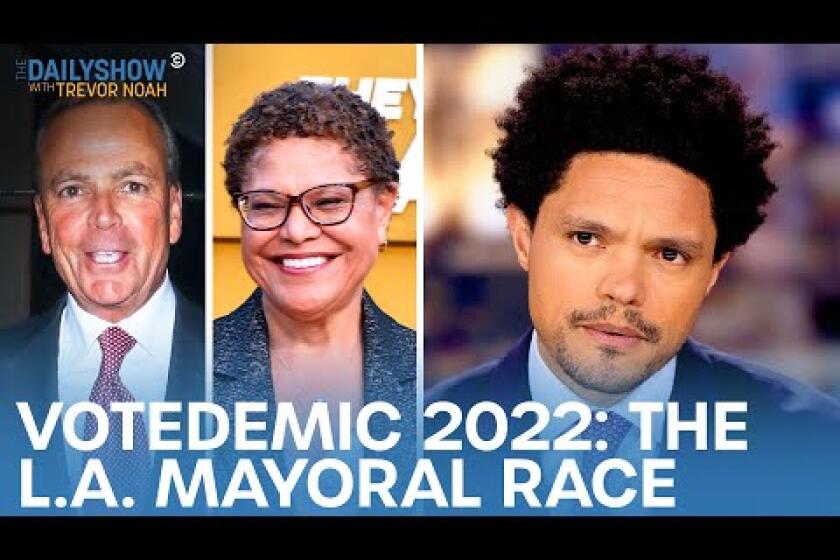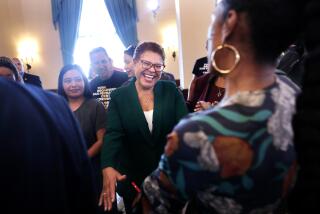L.A. mayor’s race: Rick Caruso, Karen Bass headed to November runoff
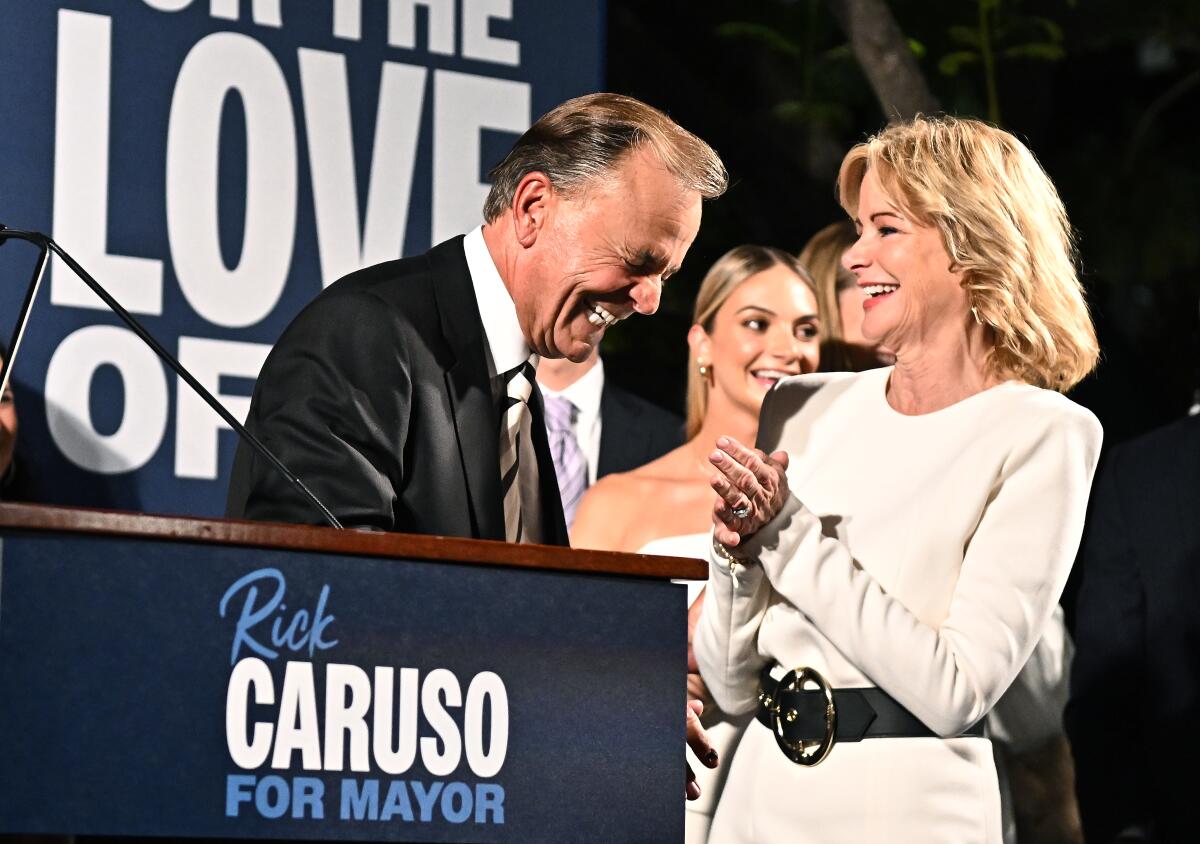
- Share via
Billionaire real estate developer Rick Caruso and U.S. Rep. Karen Bass will square off in a November runoff in their costly race to become Los Angeles’ next mayor, with the two far ahead of the rest of the primary field.
Caruso held a narrow but widening lead over Bass in partial returns early Wednesday. With slightly more than one-third of the expected votes counted, Caruso was ahead with 42% to Bass’ 37%.
Los Angeles City Councilman Kevin de León was third, far behind the leaders, with progressive activist Gina Viola fourth.
With a November showdown apparently looming, both candidates said the results put them in a good position to win five months from now.
“This is a great night because so many people have gone to the voting booth and they sent a message: We are not helpless in the face of our problems,” Caruso told supporters gathered at the Grove, his shopping mall in the Fairfax district. “We will not allow the city to decline. We will no longer accept excuses.”
The candidate called his lead “a victory story, about an entire community that refused to let the dream of Los Angeles be extinguished.”
About the same time, Bass met her supporters on the roof of the W Hotel in Hollywood. “We are in a fight for the soul of our city,” she said, “and we are going to win.”
Earlier, L.A. City Councilman Marqueece Harris-Dawson, a Bass supporter, took a swipe at Caruso’s massive spending in the campaign. “Tonight what we’re seeing already is that the big bad wolf huffed and he puffed and he blew $40 million and he still couldn’t take Karen Bass down,” Harris-Dawson said.
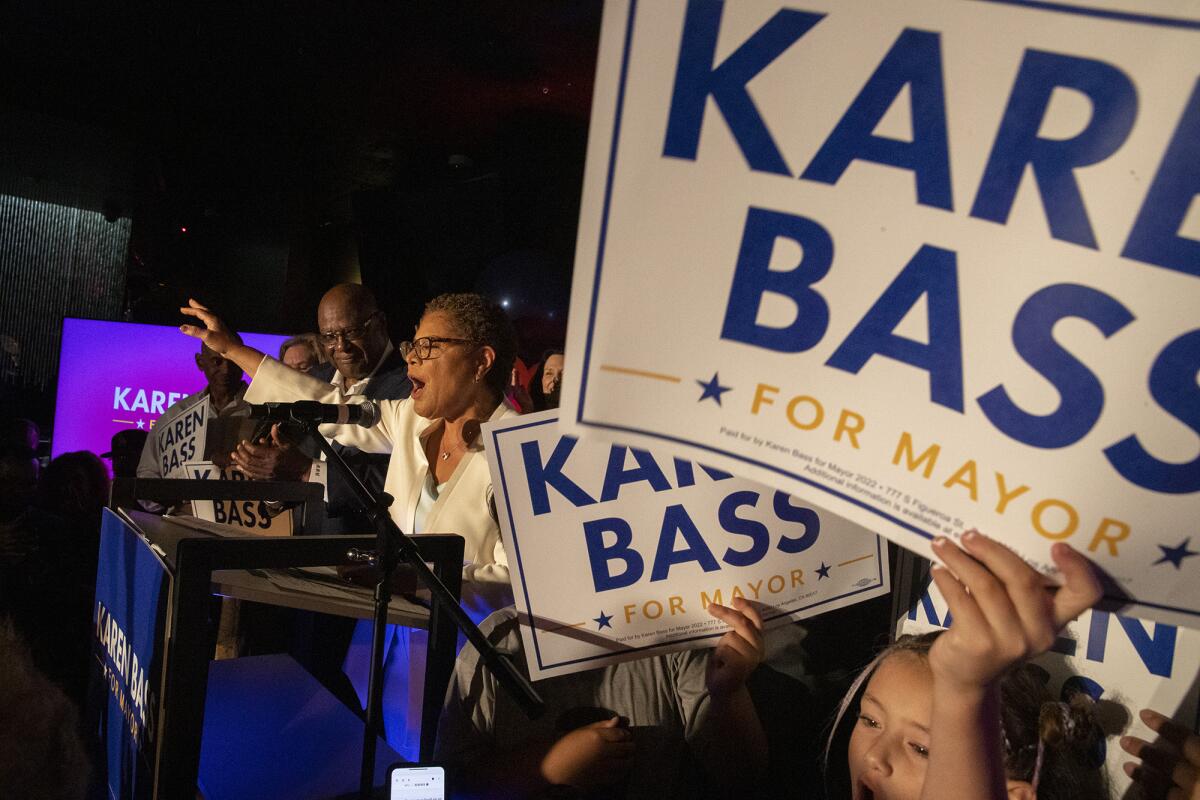
With voters in a sour mood after two years of the COVID-19 pandemic, a seemingly intractable homelessness crisis and increased gun violence, the vote was viewed as a referendum on whether Los Angeles would stick with the liberal Democratic leadership that has been in charge for most of the last half-century.
As the early front-runner in the campaign and a longtime Democratic officeholder, Bass campaigned as a coalition builder who could leverage her connections in Sacramento and Washington to bring more resources to L.A.
Caruso, a onetime Republican turned Democrat, pledged to shake up the status quo and make City Hall more efficient, while hiring substantially more police and moving rapidly to clear away homeless encampments.
The stark choice animated some voters but hardly galvanized the larger electorate, as early vote totals showed only about 18% of Los Angeles voters had cast ballots. Final results will trickle in, as mail-in ballots postmarked by election day will be accepted for one more week.
The primary election will help determine Los Angeles’ next mayor and sheriff.
The election will determine who succeeds Mayor Eric Garcetti, who won the maximum two terms and is scheduled to leave office in December. President Biden has appointed Garcetti to serve as ambassador to India, but his confirmation has stalled in the U.S. Senate. A runoff takes place if no mayoral candidate receives a simple majority of the votes cast in the primary.
The 63-year-old Caruso, waging his first campaign for public office, showed signs of the high emotion surrounding the campaign after casting his ballot Tuesday afternoon in Boyle Heights, where his Italian immigrant grandparents settled after moving west from Pennsylvania.
Caruso punched the electronic screen to cast his vote, then hugged two of his sons, who joined him for the occasion. Asked afterward to reflect on his decision to seek the mayor’s office — after turning aside the contest in earlier years — the candidate choked up and began to cry.
He recalled the home where his father grew up and where his diminutive grandmother, Josephine, was the boss.
“She had that wooden spoon in the kitchen, and she ruled the world,” Caruso said. He said his family’s journey said much more about him than the “billionaire developer” label usually used to describe him during the campaign.
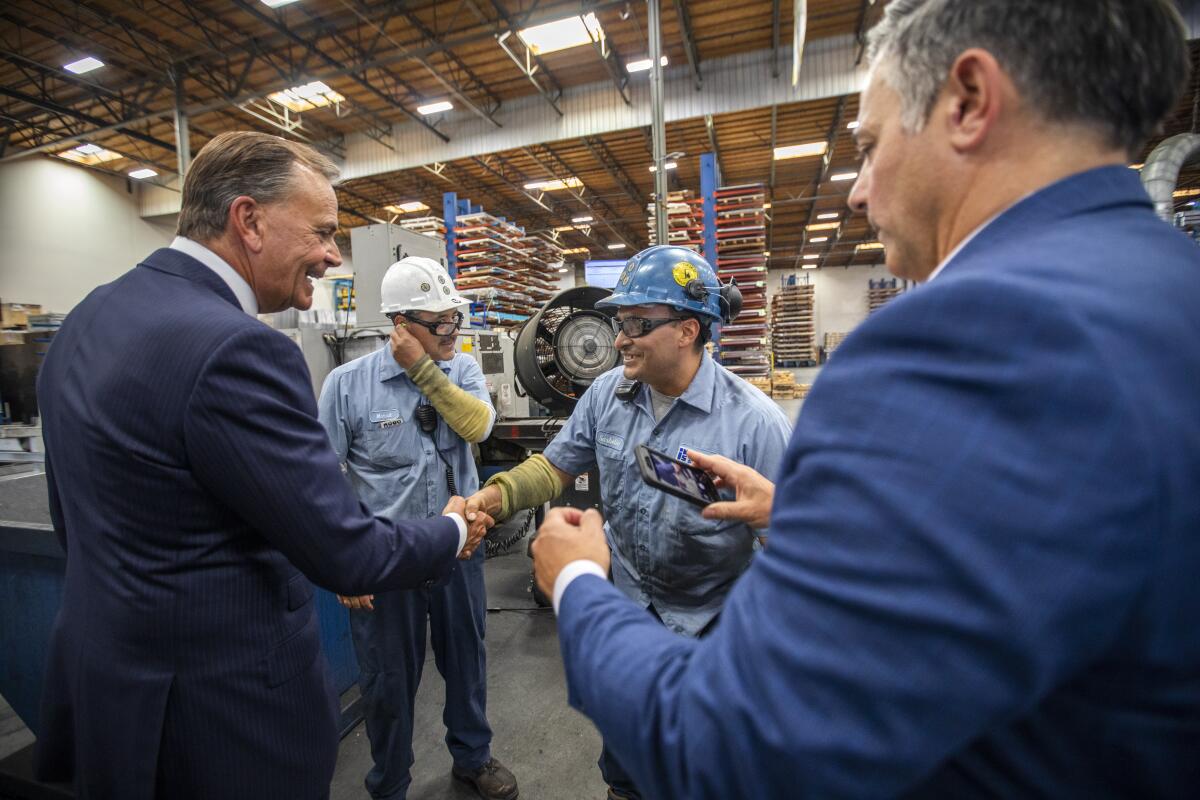
“Like you’re not a human being, right?” he said. “There’s a lot of commitment and emotion and love that went into this decision” to run for office. “It didn’t happen lightly, and so all of those emotions came up.”
Bass, bidding to become the first woman elected L.A. mayor, also had family and larger themes in mind as she cast her vote with her stepdaughter and grandson in the community room of a Baldwin Hills mall. Standing with her arms around the 7-year-old in the mall’s parking garage, Bass told reporters that it was the boy’s first time at the polls.
“It is a tradition in my family and many other families to bring your children with you so that it becomes a habit and they learn that voting is something that is critical,” said Bass, 68. “In the African American community and in the Latino community, people have fought and died for the right to vote.”
The polling place burst into applause after a grinning Bass marked her ballot.
After voting at Highland Park Senior Citizen Center in the morning, De León continued his last-minute sprint to win over and turn out working-class votes in the city’s Asian and Latino communities. He traveled from Grand Central Market downtown to Boyle Heights’ El Mercadito, where he traded fist-bumps, handshakes and hugs with potential voters.
Angelenos have signaled that they are not happy with the status quo, with one survey showing their view of the quality of life in the Greater L.A. area has reached a low ebb. UCLA’s Luskin School of Public Affairs found Los Angeles County residents this year offering the lowest scores in eight of nine quality-of-life categories since the survey began in 2016.
Voters said they were most focused on three issues as they looked for a replacement for Garcetti: homelessness, crime and public safety, and housing affordability, according to a poll by the UC Berkeley Institute of Governmental Studies, co-sponsored by The Times.
Bass has pledged to provide housing for 15,000 people during her first year in office, though it is unclear what portion of those would get permanent homes, as opposed to interim shelter.
She said she would hire enough to return the Los Angeles Police Department from its current staffing of about 9,400 sworn officers to its authorized strength of 9,700. Noting that just more than half of the city’s homicides were solved in 2020, she called for the department to hire more detectives and investigators.
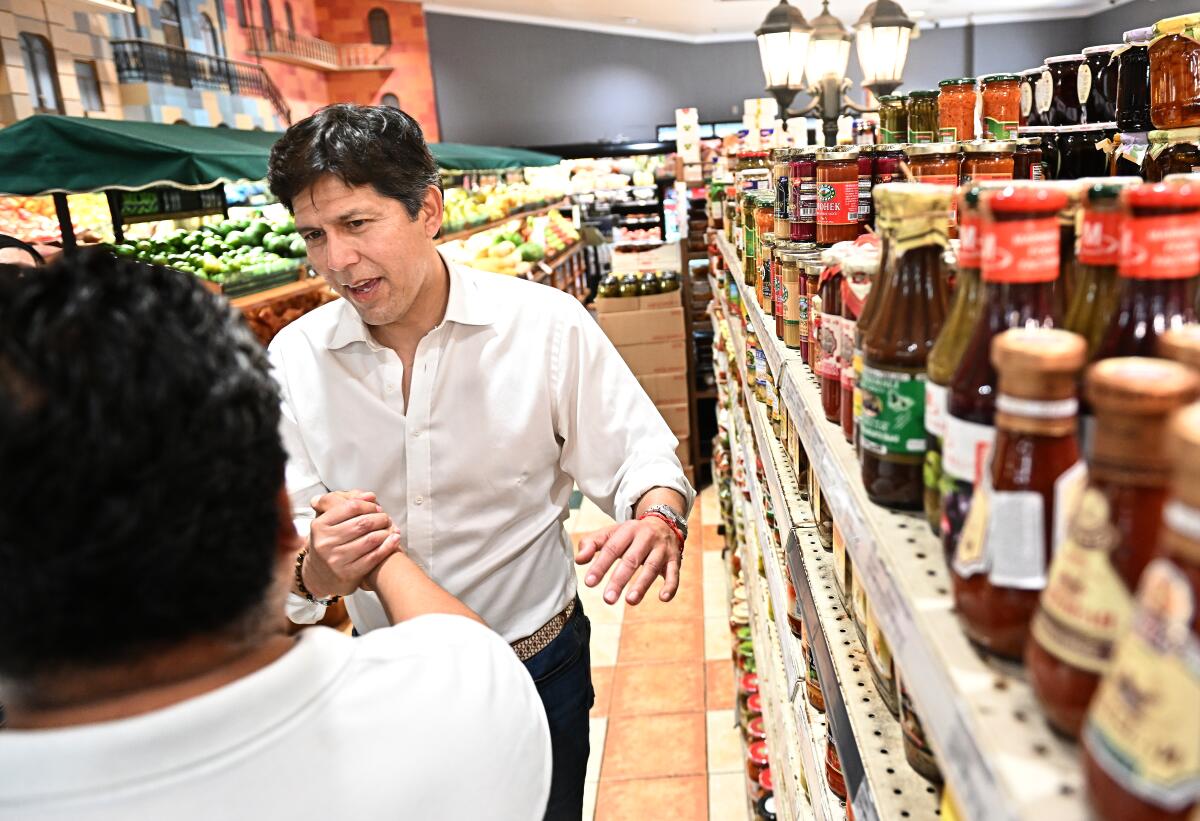
Caruso has promised to find shelter for 30,000 unhoused people in his first year in office. He said he intends to increase the size of the Police Department by 1,500 officers. Though the LAPD has struggled to hire and train enough officers, Caruso has said he will remove bottlenecks and find the money for more officers by rooting out waste in other parts of the city budget.
The race began with the close of candidate filing in February. Of the dozen candidates who qualified to be on the ballot, Bass — who served six years in the state Assembly and more than a decade in the U.S. House — was the clear early front-runner. A poll showed her with support from about one-third of likely voters, while her rivals languished in single digits.
But then Caruso launched a massive media blitz, spending nearly $41 million over the next four months to push past more established elected officials. Councilman Joe Buscaino tried but failed to get traction in the same ideological lane as Caruso, arguing for more police and quicker action to clean up encampments. Buscaino, a former LAPD officer, dropped out of the race last month and endorsed Caruso.
On the latest episode of ‘The Daily Show,’ Trevor Noah demystified the Los Angeles mayoral race.
City Atty. Mike Feuer also found his lane, as a centrist who could get things done, occupied. Unable to gain ground on Bass or the rest of the field, Feuer dropped out a few days after Buscaino. He endorsed Bass.
That left De León as the only elected city official in the contest. De León leaned heavily on his profile as a member of the working class who briefly experienced homelessness early in adulthood. But he too struggled to gain a following, even among Latino voters who he hoped would support him.
In the UC Berkeley Institute of Governmental Studies poll released the weekend before the vote, Bass had the support of 38% of likely voters, with 32% for Caruso. De León trailed with support from 6% of likely voters, essentially stuck where he was in April.
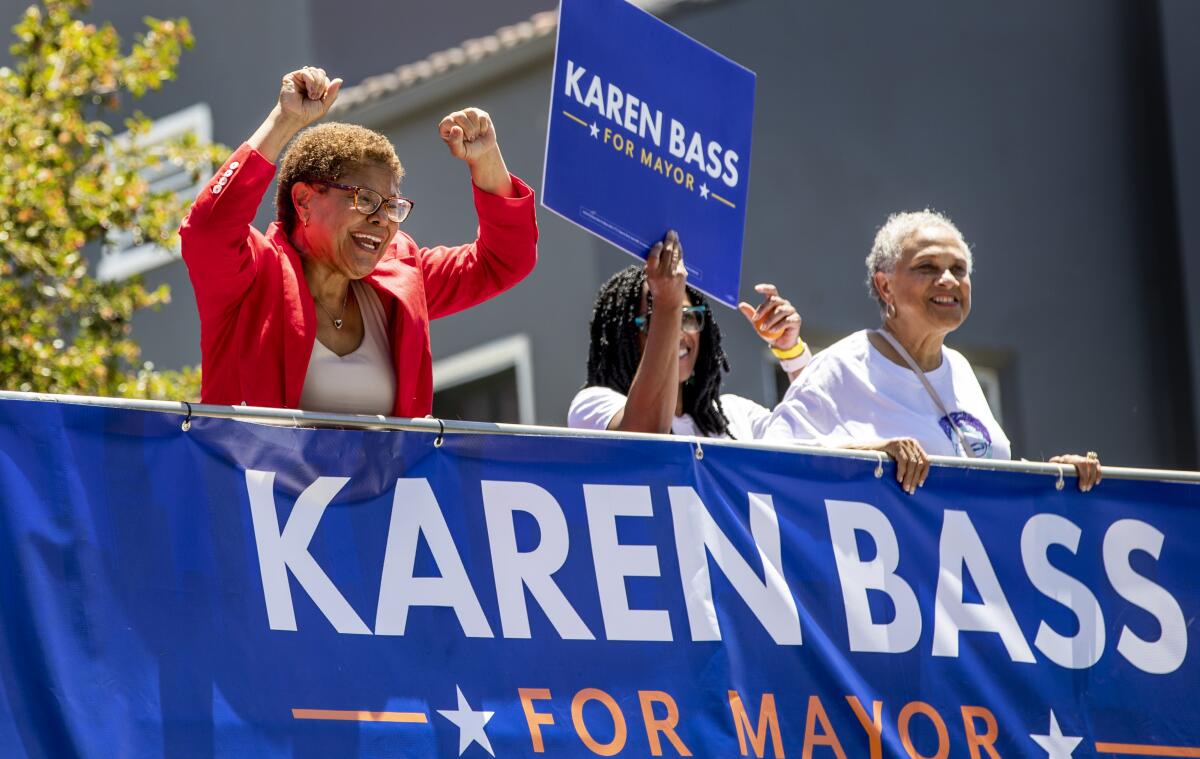
More on the mayoral race
The campaign was dominated by Caruso’s advertising, paid for mostly by his personal fortune, which he built by developing malls like the Grove in the Fairfax district and Americana at Brand in Glendale. His nearly $41 million in spending by election day was more than 12 times the amount spent by Bass.
Critics accused the businessman of trying to buy the election. He said he was merely trying to level the playing field, competing against politicians who had been getting attention for years while working on the taxpayers’ dime.
Many who chose not to vote remained impervious to the ads from Caruso and all the others.
“It just hurts my head. It really does,” said Justin Bretado, 22, of El Sereno, adding that he and his friends weren’t voting. “The bottom line is you don’t feel like it’s going to make any difference. It’s all the same old thing, every year.”
More to Read
Sign up for Essential California
The most important California stories and recommendations in your inbox every morning.
You may occasionally receive promotional content from the Los Angeles Times.

